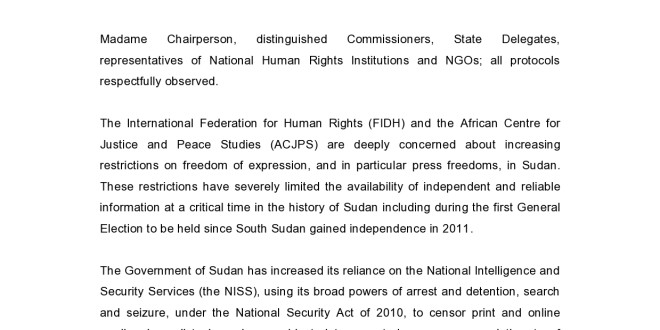Below is the oral statement delivered by the International Federation for Human Rights (FIDH) and the African Centre for Justice and Peace Studies (ACJPS) during the official agenda item “NGO statements on the human rights situation in Africa” during the 57th session of the African Commission on Human and Peoples’ Rights.
57th ORDINARY SESSION OF THE AFRICAN COMMISSION ON HUMAN AND PEOPLES’ RIGHTS
(Banjul, The Gambia, 4-18 November 2015)
Oral Statement submitted under Item 11: Activity report of the Special Rapporteur on Freedom of Expression and Access to Information Africa,
10 November 2015
Madame Chairperson, distinguished Commissioners, State Delegates, representatives of National Human Rights Institutions and NGOs; all protocols respectfully observed.
The International Federation for Human Rights (FIDH) and the African Centre for Justice and Peace Studies (ACJPS) are deeply concerned about increasing restrictions on freedom of expression, and in particular press freedoms, in Sudan. These restrictions have severely limited the availability of independent and reliable information at a critical time in the history of Sudan including during the first General Election to be held since South Sudan gained independence in 2011.
The Government of Sudan has increased its reliance on the National Intelligence and Security Services (the NISS), using its broad powers of arrest and detention, search and seizure, under the National Security Act of 2010, to censor print and online media. Journalists have been subjected to repeated summonses and threats of prosecution, arbitrary detention, blacklisting and other forms of harassment such threatening visits or telephone calls from the NISS ordering them not to report on so-called “red line” issues.
Post-print censorship, whereby entire print runs of daily editions are confiscated prior to morning distribution, is increasingly used, at great cost to newspapers. Whilst reasons are routinely not given, censorship has surged around key political events or issues deemed sensitive by the ruling National Congress Party (NCP). For example, on 25 May 2015, authorities confiscated 10 newspapers. At least one paper confiscated had featured, on its front page, details of a press conference held the previous day by the UN Special Rapporteur on Violence against Women.
On 12 April, the eve of the elections, two online newspapers were hacked. On the first day of voting, editors told ACJPS they received a phone call from the NISS instructing them to not report on the elections boycott that was organised by mainstream political opposition parties.
Journalists and outspoken activists have also been targeted for arbitrary arrest, detention, ill-treatment and torture.
Journalist Hassan Ishag, a member of the Sudanese Congress Party (SCP), was detained on 12 June 2014 after he reported the detention of the SCP leader two days earlier. Ishag was arrested by plain-clothed police officers in West Kordofan and lost consciousness when he was beaten and kicked during interrogations. He was detained without charge or judicial review for more than 3 months.
Madame Chairperson, The International Federation for Human Rights and the African Centre for Justice and Peace Studies recommend that the African Commission on Human and Peoples’ Rights:
- Calls on the Government of Sudan to end all harassment, arbitrary arrests, ill-treatment and criminal charges against journalists and activists for exercising their right to freedom of expression;
- Urges Sudan to conduct prompt, impartial and independent investigations into allegations of arbitrary detention, torture and ill-treatment of journalists, and to prosecute alleged perpetrators in accordance with international fair trial standards.
- Calls for the amendment of all laws and practices that restrict the right to freedom of expression in Sudan in line with Article 9 of the African Charter on Human and Peoples’ Rights, in particular the National Security Act of 2010, the Press and Publications Act of 2009, and the Criminal Act of 1991.
I thank you.
 African Centre for Justice and Peace Studies ACJPS | المركز الافريقي لدراسات العدالة و السلام
African Centre for Justice and Peace Studies ACJPS | المركز الافريقي لدراسات العدالة و السلام




